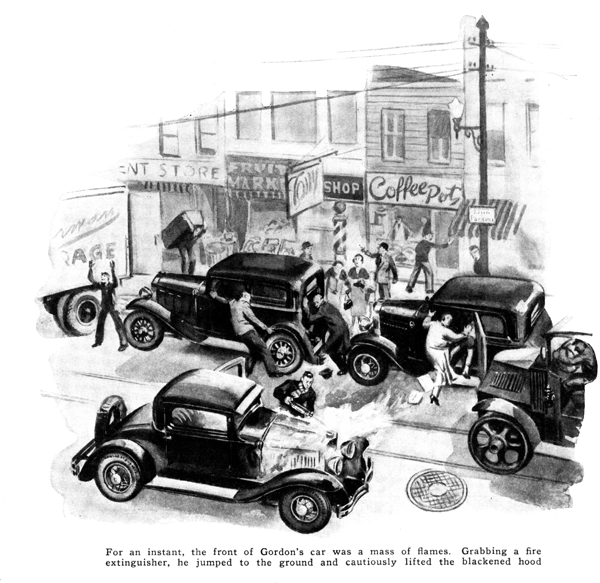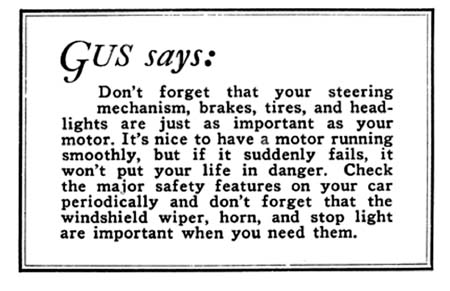December 1932
ANTI-FREEZE PROBLEM
Solved By Fire and Blast
by Martin Bunn

A brisk wind whistled an icy tune as Frank Gordon closed the radiator shutters on his car and started on his morning drive to his office.
"Must be below freezing," he thought as he pulled his overcoat higher around his neck. "It's a lucky thing I put some alcohol in the radiator last night."
As his car hummed along the road, Gordon chuckled with self-satisfaction each time he passed stalled cars with steaming radiators. For once in his life he had outwitted the cold weather and put his alcohol in ahead of time.
Suddenly, as he neared the center of town, there was a blinding flash and a loud report. For an instant, the front of Gordon's car was a mass of flames. Dazed and frightened, he shut off the ignition and brought the car to a squealing stop.
Advice came from all quarters. Passing traffic hastened to get out of his way and shoppers excitedly tried to move their parked cars to safety.
Grabbing the fire extinguisher mounted under the seat, Gordon jumped to the ground and cautiously lifted the blackened hood. To his surprise, not a trace of the flames could be seen. Instead, water trickled from a long gash in the top radiator connection. The tongues of blue flame that had enveloped the hood but a moment before had died out as mysteriously as they had appeared.
Completely puzzled, Gordon chanced driving the car the short distance to the Model Garage where he related his uncanny experience to Gus Wilson and his partner, Joe Clark.
"And you say for an instant the front of the car was a mass of blue flames?" inquired Gus when Gordon had told as best he could just what had happened. "What've you been using in the radiator -- dynamite?"
"Nope," Gordon replied, "just the old stand-by mixture of alcohol and water. But what's that got to do with it?"
"Plenty," barked Gus, "From the looks of this hose connection, pressure built up in your radiator. Something had to bust, and this was it," he declared.
Scratching his head, Gordon watched Gus pour water into the radiator. "But how can pressure build up in a radiator when there's an overflow pipe to let steam escape?" he asked, pointing to the tube in the radiator.
Gus said nothing, but continued to fill the radiator. He grinned when the water reached the top and spilled over the edges. Beckoning to Gordon to look down into the radiator he said, "The water's way above the top of that overflow now but it doesn't run off. In some way, that pipe's got clogged. Your motor heated up because you forgot to open the shutters and the alcohol boiled off and couldn't escape. After a while, the pressure got strong enough to blow right through the rubber hose and your hot motor -- all soaked, too, with gas and oil -- was sprayed with hot alcohol vapor. You're just plain lucky you didn't burn your car up."
"But how did the pipe get clogged in the first place?" inquired Gordon, "Dirt would have to be jammed in there pretty tight to stand more pressure than a rubber hose."
"It was ice that caused your trouble," Gus pointed out. "Some dirt probably got caught in there -- rust or sediment from your cooling system. Then, when you filled your radiator, water collected over the dirt and froze solid. Have you ever tried to pry ice loose from metal by pushing it when it's frozen solidly?"
With a long piece of stiff wire Gus prodded the overflow pipe. "You see," he said, "now that the ice has melted it's easy to push through the dirt. Speaking of dirt," Gus added, "judging from the stuff that's come from your radiator I'd say it's pretty dirty. Ever clean it out?"
Gordon shook his head. "Never thought I had to," he replied.
"That's why your motor overheats," said Gus. "Dirt and rust form a scale on the inside of the radiator and the heat in the water can't get through to be absorbed by the air. You ought to clean it out at least twice a year. Especially before you dope your cooling system for the winter.
"It's easy. All you have to do is buy a prepared radiator cleaner, dissolve it in the right amount of water, put it in the radiator, and then drive the car for about two hundred miles. When you drain it out all the dirt and sludge come with it."
"By the way, Gus," Gordon said, lifting the hood and pointing to the water pump, "My pump uses an awful lot of grease. Where does it all go?"
"Right into your radiator," was the reply. "And it's the best little scale former there is. Half the dirt in your cooling system probably has come from the grease you've forced by the bearings on that pump. The answer is to use a waterproof grease and use it sparingly.
"But getting back to anti-freeze mixtures, why use alcohol?" Gus asked. "That went out of date with kerosene lamps."
"What's the matter with alcohol?" asked Gordon. "It does the job and it's cheaper than anything else."
"It's not so cheap when you stop to consider it," Gus insisted. "Alcohol boils at about one hundred and seventy degrees, so if you run your motor at the right temperature you have to keep strengthening the mixture.
With a solution of glycerin or ethylene glycol there's nothing to worry about as far as boiling is concerned. They may cost more for the first filling, but unless you've got a leaky radiator, the same solution is good for several years."
"Yes, and if your cooling system happens to have a small leak that you don't know about, you sprinkle the road with dollar bills," Gordon objected.
"Well, that shouldn't be any drawback," grunted Gus. "It's no job at all to find leaks and fix 'em. One thing lots of people don't realize, though, is that solutions expand when they're heated. If you use an expensive anti-freeze, don't fill the radiator right up to the top of the overflow pipe but leave a little room for expanding.
"The advantage of glycerin or ethylene glycol," continued Gus, "is that you can run your motor just as hot in winter as you do in summer without fear of having your anti-freeze evaporate."
"How would I make up a glycerin solution?" Gordon asked, "Do I have to buy a special hydrometer as I did for the alcohol?"
"Nope. Glycerin makes the water heavier so you can see your battery hydrometer. To make a solution that'll be safe down in zero, add enough glycerin to water to make the hydrometer float level with the eleven hundred mark," said Gus, indicating the mark on a hydrometer he picked up from the repair bench. "That'll be almost a forty percent solution. A thirty percent solution will be safe down to about ten degrees, and the hydrometer reading for that proportion is one thousand and eighty."
"That sounds easy," Gordon commented. "Then if I want to test it at any time, all I've got to do is use the hydrometer."
"Right, But you want to make sure the solution is somewhere near room temperature," Gus reminded him. "Those readings only hold at sixty degrees."
"You win, Gus," Gordon finally agreed. "Fill her up with a solution of glycerin. I'll leave the car here for the rest of the day so you can clean out the cooling system and patch up any leaks you may find."
END
L. Osbone 2019
